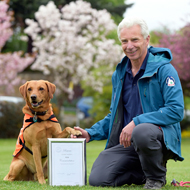
Search and rescue dog found missing woman in a blizzard
A young search and rescue dog has been awarded a PDSA commendation after he managed to find a critically injured missing woman in blizzard conditions.
Three-year-old Rauour, which means 'red' in Icelandic, is a specially trained search and rescue dog, who works as part of the Tweed Valley Mountain Rescue Team in Scotland.
In February last year, the team was called out to find a missing person who was feared to be at considerable risk. A Met Office amber weather warning was in place and blizzard conditions had set in around the Innerleithen area in the Scottish Borders.
After a team of 20 people had spent three fruitless hours searching on foot, Rauour and his handler John Romanes were dispatched to an area on Leithen water. Rauour immediately began searching deep inside a thick conifer forest and, after only a couple of minutes, he signalled to his handler by barking enthusiastically.
Rauour had found the missing woman just in time. She was trapped in the hole of a tree root, unconscious and suffering from severe hyperthermia. Due to the weather conditions, darkness and the woman's position, foot crews had passed by her location hours earlier without spotting her. Rauour's handler Mr Romanes and his search partner Roddy administered emergency first aid and the Royal Navy helicopter airlifted the woman to hospital.
Mr Romanes commented: "Rauour’s detection skills really came to the fore that night. His role as an air scenting search dog was more effective than a 20-strong team performing a line search on the ground. Without him finding the casualty when he did, the outcome could have been very grave indeed."
Rauour's commendation was presented by PDSA vet John Faulkner at the Tweed Valley rescue team's base in the Scottish town of Melrose. He said: "Rauour’s story really epitomises the value that animals bring to our lives. There is no doubt that without Rauour’s actions the situation would have been very different.
"The work of search and rescue dogs across the country is absolutely vital – their skills are priceless and Rauour’s story serves as a reminder of just how lucky we are to have these dogs here to help us."
Image © PDSA



 The Animal and Plant Health Agency (APHA) has updated its online reporting service for dead wild birds.
The Animal and Plant Health Agency (APHA) has updated its online reporting service for dead wild birds.